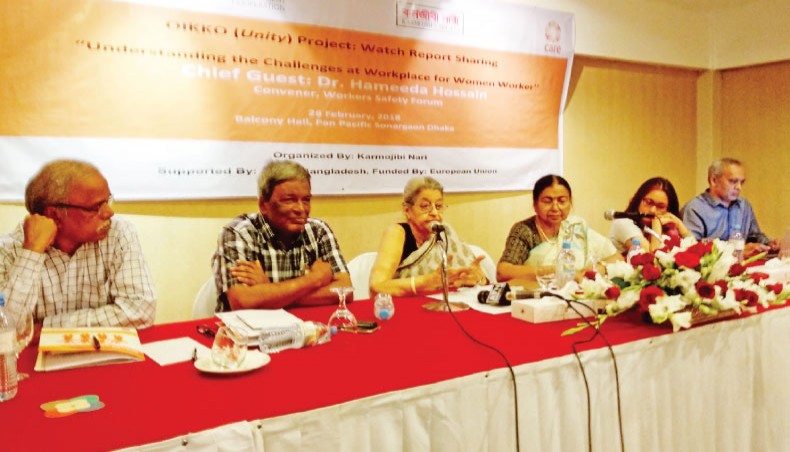Worker Safety Forum convener Hameeda Hossain speaks at a report launching programme held at the Sonargaon Hotel in Dhaka on Monday. Karmojibi Nari president Pratima Paul Majumder, Bangladesh Institute of Labour Studies executive director Syed Sultan Uddin Ahmed, National Garment Workers Federation president Amirul Haque Amin and Rajshahi University professor Jakir Hossain were present, among others. — New Age photo
——————————————————————————————————————————————————-
Almost 85 per cent of female workers in the readymade garment sector face verbal harassment in their workplace, according to a report launched Monday. The watch report showed 84.7 per cent of female workers in the RMG factories faced verbal harassment including scolding and use of slang by their superiors, while 71.3 per cent of female workers experienced mental harassment at their workplace.
Workers complained that the authorities scolded them regularly and very often they had to hear slang used indicating their parents and threat of expulsion from job, the report said.
Karmojibi Nari and CARE Bangladesh jointly commissioned the report titled ‘State of Rights Implementation of Women Ready-Made Garment Workers’. Rajshahi University professor Jakir Hossain conducted the study. ‘Majority of the workers have brought the allegation that they are harassed mostly by the supervisors — physical (52 per cent) and verbal (70 per cent) — adding the fact that line-chief, floor in charge, and production managers also often harass them,’ the watch report said.
The report also showed that 20 per cent of female workers experienced physical harassment, while 12.7 per cent of them faced sexual harassment at their workplace.
The most common physical and sexual harassment was slap and push on different parts of their body and unwanted touch in their body and offering illicit love affairs, it said. At a meeting held to share the findings of the watch report at the Sonargaon Hotel in Dhaka, Jakir Hossain said that 150 workers were selected from Dhaka and Gazipur for the interview and the quantitative approach and employed survey method had been adopted for conducting the study. Karmojibi Nari president Pratima Paul Majumder presided over the event while Worker Safety Forum convener Hameeda Hossain attended as chief guest.
According to the study, many garment workers are deprived of their lawful rights related to employment contracts like appointment letter, identity card, pay slip, service book and attendance card.
It showed that 31.3 per cent respondents had no appointment letter, 32 per cent got no pay slip from their employers and 24.7 per cent had no identify card. The study said that about 15 per cent respondents informed that maternity leave was not given at their factories while 7.3 per cent of the respondents even did not know whether workers of their factories were allowed to enjoy maternity leave.
Seventy-eight per cent of the respondents claimed that maternity leave was given to the workers of their factories but employers did not follow the legal provisions fully.
The study found that the factories of 36.7 per cent respondents allowed maternity leave for two and three months instead of four months.
It found lack of arrangement of social protection measures including retirement benefit, health insurance, group insurance, provident fund, gratuity, skill development initiative, transport support, and residential arrangement. According to the survey, 91.3 per cent of employers do not provide transport while 92 per cent have no arrangement for accommodation. About sixty per cent workers do more overtime work than the hours stipulated in the law — maximum two hours daily, the study found.
It said that 27.3 per cent surveyed workers reported that on average they worked three hours daily as overtime while 28 per cent of the workers reported that they worked five hours and more as overtime daily. The study suggested making changes in some provisions of the Bangladesh Labour Act for eliminating harassment and discrimination at the workplace. It also suggested proper implementation of the labour act to ensure gender specific needs of female workers at the workplace. At the report launching meeting, experts said that the government should ensure decent life for workers through proper implementation of laws and rules.
Khondoker Golam Moazzem, research director of the Centre for Policy Dialogue, said that workers had been deprived of proper payment of overtime as factory authorities did not provide the allowance following rules. He suggested identifying whether buyers are responsible for ensuring decent life for RMG workers. Combined Garment Workers Federation president Nazma Akter said, ‘Forming anti-harassment committees is more difficult than forming a trade union in the factories.’ She said that the study should also include the wage structure and living standard of workers as the quality of job and workers’ life were still in dire straits. Amirul Haque Amin, president of National Garment Workers Federation, said that without changing the condition of workers the graduation of the country to a middle-income one was impossible.
He said that the government should work out what amount of money should be the minimum wage for the workers in a middle-income country. Bangladesh Institute of Labour Studies executive director Syed Sultan Uddin Ahmed said, ‘Political parties, civil society and economists have responsibility to the four million workers engaged in the readymade garment sector in Bangladesh and they should raise their voice for setting a reasonable wages for the RMG workers.’ He also urged the government to implement labour laws to protect the workers’ rights so that no one faces job termination due to filling complaint over harassment
Published link: New Age BD, News Paper

